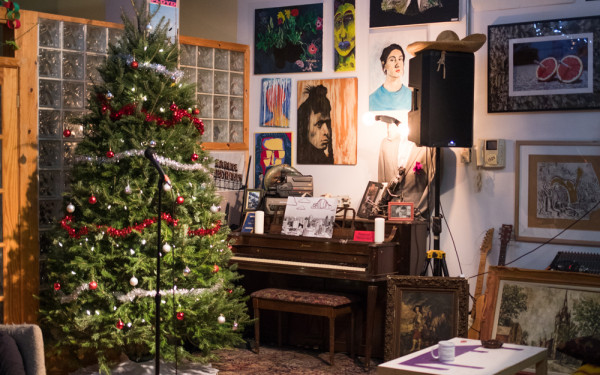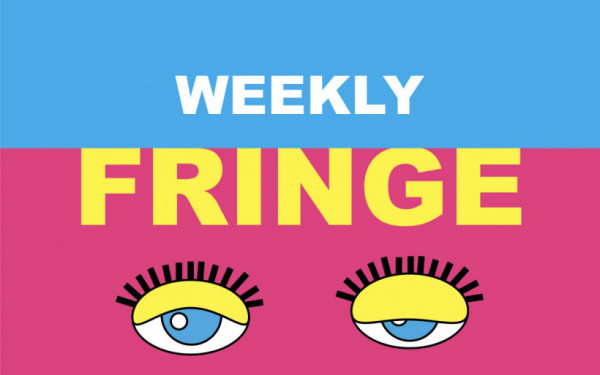Smaller Montreal venues are ready to open their doors to live music and crowds again
Inside Turbo Haüs. (Learn about the history of some of Montreal’s small venues!) Photo Courtesy Pier-Anne Bilodeau
These city gems are just a few of them worth checking out
Montreal is home to a wide array of venues that promote and support local artists and musicians. With the government lifting restrictions that delivered a massive blow to so many small businesses, the entertainment industry can finally rejoice.
As spring nears and people are itching to go back out to support their favourite venues are welcoming them back with open arms. The city is flush with spots that offer a variety of music genres. These are just a few places on the long list of Montreal staples that range from Notre-Dame-de-Grâce to the Plateau.
The Wheel Club – 3373 Cavendish Boul.
“Any style of music is welcome here. We’ve had R&B, classical music, Celtic. You name it.” — Clifford Schwartz
The Wheel Club, which has been around since the early 1960s, is nestled in the basement of a building on the corner of Cavendish Boul. and Sherbrooke St. W. Having started off as a social club for veterans, it made the shift to a music and arts venue in 1981 with its claim to fame being their weekly open-mic nights.
Hillbilly Night, which the Wheel Club hosts every Monday, is Montreal’s longest running open-mic group. While the Monday night crowd might consist mostly of country music lovers, Clifford Schwartz, The Wheel Club’s president, invites in all kinds of music and arts.
“Any style of music is welcome here. We’ve had R&B, classical music, Celtic. You name it,” Schwartz said. He added that they’ve also hosted art shows, political events, and comedy nights. Because of his love for all kinds of music, Schwartz said there is no specific demographic they cater to. Oftentimes you see three separate generations of music lovers partying together.
The Wheel Club is a non-profit and has come to be considered a cultural hub of NDG with its accommodating size that fits full-set bands and doesn’t need to worry about noise complaints from neighbours.
To keep business afloat during the pandemic, the club started live-streaming bands for people to watch and listen to from the comfort of their own homes. Working off voluntary donations, this set-up not only kept the Wheel Club alive, but also gave musicians the chance to book gigs during a time when live music was almost unheard of.
“It worked out really well,” said Schwartz. “We built up a lot of good will that way, just in the community in general.”
Café Campus - 57 Prince-Arthur St. E
“Decisions are taken collectively on spending and on any direction [with the club] that we want to take.” — Marc St-Laurent
Spread out over three floors, Café Campus is one of Montreal’s go-to spots for students looking to burn off some steam on the dance floor. Established in 1967 on the campus of Université the Montréal, the club made the move from Côte-des-Neiges to the Plateau in 1993.
Café Campus has a slightly different backstory compared to other venues across town. In the 1970s, unionized employees discovered that the Student Association at UdeM was planning to sell the establishment to private investors. After mobilizing with the community, the employees eventually purchased the club themselves, and in 1981 turned it into a workers co-op.
“Decisions are taken collectively on spending and on any direction [with the club] that we want to take,” said Marc St-Laurent, Café Campus’ music programmer.
Those looking to get their foot in the door often start working as bartenders, busboys, or security, and after one year of service are eligible to enter the co-op. With a general assembly held once every three to four months, members can then vote on new entries into the program. Once in, some of the benefits are rarities for the food and beverage industry: earning a salary and insurance coverage.
They often host live concerts on any given day of the week on their Petit Campus stage which is located in the same building and can fit around 300 people. St-Laurent makes sure that local artists know they have the club as a platform to help gain recognition by working with local promoters and record labels.
On top of their live shows, Café Campus operates Club Nights every Tuesday and Thursdays through Saturdays which offer a variety of music from retro, to 2000s, to today’s hits.
Turbo Haüs – 2040 St. Denis St.
“We call them Gorilla Gigs, and, basically, we wouldn’t tell anybody who was playing until 20 minutes before the show started.” — Sergio Da Silva
Located in the Quartier des Spectacles, Turbo Haüs often hosts heavy metal styles of music. With a touch of an art deco vibe style to the place, it may come as a surprise to find that their main focus is on hardcore and punk bands.
The venue is neatly tucked into the bottom of a residential building, making it easy to miss if you’re walking by it during the day. But come evening there might be an entirely different scene laid out in front of you.
Making the most out of its outdoor space during the pandemic, the owners of Turbo Haüs have figured out a way to bring the crowd its live music and still abide by health and safety protocols. Utilizing their terrace that is located just in front of the entrance, they began setting bands up to play a gig just quick enough to be able to disassemble them before anyone can respond to any noise complaints.
“We call them Gorilla Gigs, and, basically, we wouldn’t tell anybody who was playing until 20 minutes before the show started,” said part-owner, Sergio Da Silva. “They’d play a 20 minute set, and then it would be over.”
Da Silva is excited for the year ahead though, knowing that with the easing of restrictions they can start having bands back inside and on stage. But, with the return of music festivals in the city he is also looking into getting the proper permits to allow outdoor shows to add to the already lively vibe of the Quartier des Spectacles
Each year, Turbo Haüs also takes part in Montreal’s punk music festival, Pouzza, hosting several different shows during the three days of festivities. Anticipating a big turnout this summer after two years of lockdowns, Da Silva is hoping that the use of both the indoor and outdoor space will start to make up for the last couple of years of lost revenue.
“It’s a lot of fun to be involved in these types of festivals,” he said. “Especially with the fact that this will be the first year that we are allowed to have our terrace outside and shows at the same time. It’s going to be a big, big change for us.”
Blue Dog Motel — 3958 St. Laurent Blvd.
“We’ve enlarged our stage and added a backline, drum kit, and other equipment to accommodate instruments.” — Raphael Kerwin
This Montreal staple, which has been around for over 30 years, decided to add its own unique twist to its bar scene. Since 2013 Blue Dog has been offering barber services alongside DJs and drinks. From hair colouring to cocktails, Blue Dog has found a successful way to stand out among the many bars and venues across town.
Located on St. Laurent Blvd., one of Montreal’s busiest streets for nightlife, Blue Dog happily boasts a versatile scene for bargoers.
“We’ve enlarged our stage and added a backline, drum kit, and other equipment to accommodate instruments,” said owner Raphael Kerwin. “Many different artists, student groups, comedy shows, etc. take place at Blue Dog.”
Kerwin took over ownership in 2008 after having DJ’ed there himself in the early 2000s. Though at the time it was known for more underground hip hop nights and other niche genres, they have since started expanding their live music events to include rap, rock, and pop on top of their DJ nights.
With the addition of a terrace that was installed two years ago, the upcoming summer is looking bright. Like almost all other businesses, Blue Dog has had to deal with closures throughout the past two years, but Kerwin is excited to get back to their normal hours of 9 p.m. to 3 a.m., seven days a week, starting Mar. 12.
The city isn’t lacking in choices. While the list of Montrealer's favourite music hotspots can go on for days, these four can be a starting off point–or the spot where you just might end your night ringing in last call.


